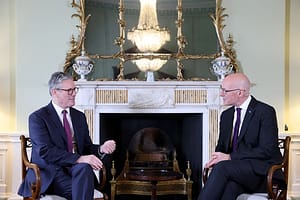Here’s why
The Conservative party’s squeeze on Ukip continues with 51 per cent of 2015 Ukip voters saying they will now vote Conservative.
- Con 48 per cent (-2)
- Lab 30 per cent (+5)
- LD 10 per cent (-2)
- Ukip 5 per cent (-2)
- SNP 4 per cent (NC)
- Green 3 per cent (NC)
- Other 1 per cent (NC)
(comparison with Sunday Mirror poll published 23 April 2017)
The Conservatives lead Labour across all social grades including by 46 per cent to 32 per cent among DEs. The only age groups more likely to vote Labour than Conservative are 18-24 year olds (51 per cent v 26 per cent) and 25-34 year olds (51 per cent v 28 per cent). These age groups are considerably less likely to vote than older, more Conservative people.
Q. Please indicate which one party leader who, in your view, best fits each of the following descriptions:
| Statement | Theresa May | Jeremy Corbyn | Tim Farron | Paul Nuttall | Nicola Sturgeon | Don’t know |
| Best to represent Britain on the world stage | 49 per cent | 17 per cent | 4 per cent | 2 per cent | 2 per cent | 25 per cent |
| Most likely to deliver improvements to the NHS | 28 per cent | 38 per cent | 5 per cent | 2 per cent | 3 per cent | 24 per cent |
| Best to lead Britain’s negotiations over Brexit | 50 per cent | 15 per cent | 5 per cent | 3 per cent | 2 per cent | 24 per cent |
| The one I’d most want to be stranded on a desert island with | 26 per cent | 19 per cent | 8 per cent | 3 per cent | 3 per cent | 41 per cent |
| Most likely to keep Britain safe from terrorism | 47 per cent | 14 per cent | 3 per cent | 4 per cent | 1 per cent | 30 per cent |
| Best to look after the interests of hard working families | 32 per cent | 35 per cent | 5 per cent | 3 per cent | 3 per cent | 22 per cent |
| Most likely to raise school standards | 35 per cent | 28 per cent | 6 per cent | 2 per cent | 2 per cent | 26 per cent |
| Most likely to reduce net migration to the UK | 39 per cent | 9 per cent | 3 per cent | 18 per cent | 1 per cent | 30 per cent |
Base: All respondents (n=2,007) Nicola Sturgeon tested in Scotland only
- Voters are more likely to say that Theresa May best fits the majority of descriptions tested, with the exception of being most likely to deliver improvements to the NHS, for which Jeremy Corbyn is more likely to be seen as the best fit (38 per cent vs 28 per cent Theresa May).
- Voters are more split as to which party leader is best to look after the interests of hard working families (32 per cent May vs 35 per cent Corbyn).
- While 92 per cent of Conservative voters say that Theresa May is best to lead Britain’s negotiations over Brexit, just 44 per cent of Labour voters same about Corbyn. One in five Labour voters (19 per cent) say that May is best to lead Britain’s Brexit negotiations.
- A similar trend is apparent with the leader seen to be most likely to keep Britain safe from terrorism, with one in five Labour voters (20 per cent) saying Theresa May is best suited for this.
Q. For each of these pairs of statements, which one comes closest to your view?
| Statement | per cent | per cent | Statement |
| I will vote for the party which I think is best for Britain | 87 per cent | 13 per cent | I will consider voting for a party I don’t usually support to stop one party winning too large a majority |
| Theresa May and the Conservative party are likely to win the general election | 86 per cent | 14 per cent | Jeremy Corbyn and the Labour party are likely to win the general election |
| I have definitely made up my mind who I will vote for on 8 June | 68 per cent | 32 per cent | I have not yet made up my mind who I will vote for on 8 June |
| I would expect to pay more tax if the Conservatives win the general election than if Labour win it | 53 per cent | 47 per cent | I would expect to pay more tax if Labour win the general election than if the Conservatives win it |
| I believe Theresa May when she says she wants to try and help people who are ‘just about managing’ | 47 per cent | 53 per cent | I do not believe Theresa May when she says she wants to try and help people who are ‘just about managing’ |
Base: All respondents (n=2,007)
- Counter-intuitively perhaps, people are slightly more likely to say that they expect to pay more tax if the Conservatives win the general election as opposed to if the Labour party won (53 per cent v 47 per cent).
- A Conservative victory on 8 June is widely anticipated, with 86 per cent of British adults saying so when forced to choose between that and a Labour victory, this figure includes 71 per cent of Labour voters.
- Although a third of the public (32 per cent) say they have not yet made their minds up about who they will vote for on 8 June, the most certain group about their vote are those aged 65+. The over 65s are the most likely to turn out to vote and to vote Conservative (66 per cent of this group say this will vote Conservative).
- There is little evidence to suggest intent to vote tactically, with 87 per cent of British adults saying that they will vote for the party which they think is best for Britain (as opposed to 13 per cent who will consider voting for another party to stop one party getting too large a majority).
Methodology Note: ComRes interviewed 2,007 British adults online between 10th and 12th May 2017. Data was weighted to be demographically representative of all adults and by past vote recall. Voting intention figures are calculated using the ComRes Voter Turnout Model. ComRes is a member of the British Polling Council and abides by its rules.
Provided by, ConRes, Sunday Mirror and the Independent.





Leave a Comment